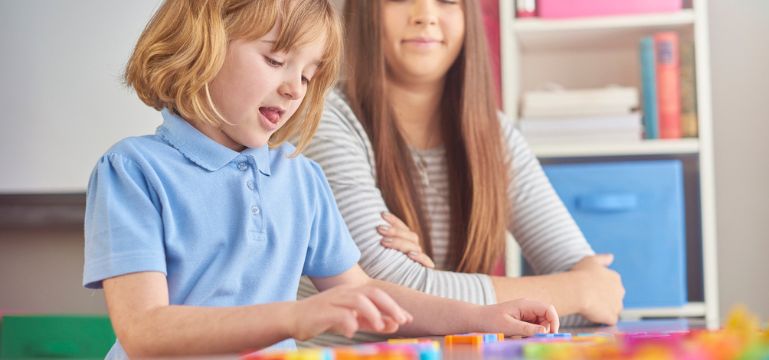Supporting the well-being of pupils through self-referral to the school’s highly effective nurturing ‘Nest’ provision

Quick links:
Information about the school
Coed Glas Primary serves the community of Llanishen to the north of Cardiff. The school has 535 pupils on roll. The area surrounding the school has a mixture of social, rented and privately owned property. The school population reflects this rich and diverse catchment area. Approximately 36% of pupils are eligible for free school meals, which has increased significantly over the past several years with the local authority average being 21.5%. The school is within the 20-30% most deprived area in Wales according to the Welsh Index of Multiple Deprivation. The number of children with EAL has risen to 28%. Due to increasing numbers of children requiring a school place in north Cardiff, the school has admitted up to 90 children in each year group over the last 7 years, resulting in 3 classes per year group in many cases.
There are 18 mainstream classes of single aged groupings, a 48-place nursery and a special resource base (SRB) catering for up to 16 children with hearing impairment from across Cardiff.
Context and background to the effective or innovative practice
The school sees well-being as at the very heart of everything it does. It aims to provide a safe and inclusive environment where everyone is welcomed, celebrated and can thrive. The school believes in the power of values and aims to empower the children to fulfil their potential as kind and respectful members of the community. The school ensures that the learning environments are places which inspire curiosity and creativity.
Over the last two years the school has seen more pupils requiring emotional support than ever before. During this period, the school ensured that all members of staff received well-being training and increased the number of well-being practitioners. However, the school also recognised that several pupils needed a different approach. The leadership team started to explore how they could best support these pupils through the creation of a bespoke nurturing provision. This involved:
-
discussions with specialist education teams
-
visits to other schools and making professional learning links with their staff
-
training members of Coed Glas’ own staff
-
creating a teaching and learning responsibility (TLR) position to give the provision the best chance of succeeding and to ensure longevity
-
use of the existing budget to staff the provision
-
making it a priority on the School Development Plan
Description of nature of strategy or activity
Over the last few years, the school fostered and nurtured supportive and caring relationships with families that were further enhanced during COVID. The school recognised that knowing families in depth was the key to not only developing strong relationships but also to improving outcomes for pupils.
Leaders and staff invested heavily in getting to know the pupils and meeting their well-being needs effectively. For example, in the well-being sessions at the beginning of every day, pupils choose their own activities to help them settle and prepare for learning. These sessions enable staff to observe pupils and support those they identify as needing emotional, mental and physical support. To further improve this, the leadership team used some of the school’s delegated budget to fund and train members of staff to deliver nurture provision in ‘The Nest’. Since opening in September 2022 and up until March 2023, the facility supported a fifth of the school’s pupils through carefully planned small groups, individual sessions and a successful self-referral system. This system was established to provide pupils with the opportunity to speak to a trained member of staff about any difficulties they are having or worries they would like to share. The school originally offered this to Year 5 and Year 6 pupils, but because of its success rolled it out to Year 3 and Year 4 pupils as well. Pupils request an individual slot during lunchtime which is booked by their class teacher on a central booking system. These are informal, one-to-one sessions where the pupils play games and take part in creative activities whilst talking through their worries or difficulties. Staff blank out slots for any pupils who they view as needing a more urgent appointment. Staff record details of these sessions and use this to gain a more holistic understanding of the pupil. Where appropriate, the well-being practitioners will share this information with the child’s class teacher and discuss whether they need class-based support.
Staff provide pupils that access the self-referral system on a regular basis the opportunity to be part of a group attending more intensive emotional well-being support sessions. These sessions take place daily and run over a half term. The focus of the sessions is bespoke to the needs of the pupils who have self-identified through the referral system. This allows staff to spot those pupils who they would not necessarily know required additional emotional support.
What impact has this work had on provision and learners’ standards?
Since the introduction of the self-referral system, the number of children accessing the provision has increased significantly and children are now more confident in asking for support for their emotional well-being and know how to do this.
Data from the well-being assessments carried out at the beginning and end of the half term block, show progress in all areas for every child. Pupils and staff questionnaires highlight the positive impact ‘The Nest’ provision has on individual pupils.
Observations by class teachers show that pupils are beginning to transfer what they have learned into the classroom and wider social situations. For example, one child now shows high levels of self-esteem when completing tasks.
How have you shared your good practice?
Coed Glas is an initial teacher education (ITE) lead school and provides training for students from other schools. These students have benefitted from visiting ‘The Nest’ to see the provision in action.